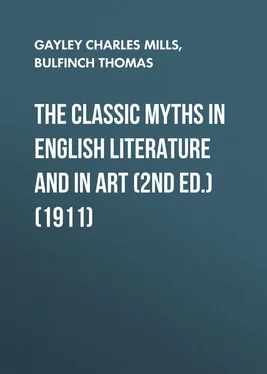Thomas Bulfinch - The Classic Myths in English Literature and in Art (2nd ed.) (1911)
Здесь есть возможность читать онлайн «Thomas Bulfinch - The Classic Myths in English Literature and in Art (2nd ed.) (1911)» — ознакомительный отрывок электронной книги совершенно бесплатно, а после прочтения отрывка купить полную версию. В некоторых случаях можно слушать аудио, скачать через торрент в формате fb2 и присутствует краткое содержание. Жанр: foreign_antique, foreign_prose, на английском языке. Описание произведения, (предисловие) а так же отзывы посетителей доступны на портале библиотеки ЛибКат.
- Название:The Classic Myths in English Literature and in Art (2nd ed.) (1911)
- Автор:
- Жанр:
- Год:неизвестен
- ISBN:нет данных
- Рейтинг книги:4 / 5. Голосов: 1
-
Избранное:Добавить в избранное
- Отзывы:
-
Ваша оценка:
- 80
- 1
- 2
- 3
- 4
- 5
The Classic Myths in English Literature and in Art (2nd ed.) (1911): краткое содержание, описание и аннотация
Предлагаем к чтению аннотацию, описание, краткое содержание или предисловие (зависит от того, что написал сам автор книги «The Classic Myths in English Literature and in Art (2nd ed.) (1911)»). Если вы не нашли необходимую информацию о книге — напишите в комментариях, мы постараемся отыскать её.
The Classic Myths in English Literature and in Art (2nd ed.) (1911) — читать онлайн ознакомительный отрывок
Ниже представлен текст книги, разбитый по страницам. Система сохранения места последней прочитанной страницы, позволяет с удобством читать онлайн бесплатно книгу «The Classic Myths in English Literature and in Art (2nd ed.) (1911)», без необходимости каждый раз заново искать на чём Вы остановились. Поставьте закладку, и сможете в любой момент перейти на страницу, на которой закончили чтение.
Интервал:
Закладка:
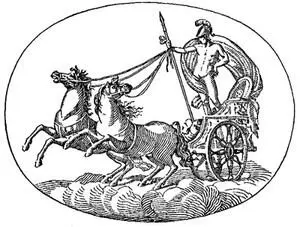
Fig. 12. Ares (Mars)
He was lame of gait, – a figurative suggestion, perhaps, of the flickering, unsteady nature of fire. According to his own story, 28 28 Iliad, 18, 395.
he was born halt; and his mother, chagrined by his deformity, cast him from Heaven out of the sight of the gods. Yet, again, 29 29 Iliad, 1, 390.
he says that, attempting once to save his mother from Jupiter's wrath, he was caught by the foot and hurled by the son of Cronus from the heavenly threshold: "All day I flew; and at the set of sun I fell in Lemnos, and little life was left in me." Had he not been lame before, he had good reason to limp after either of these catastrophes. He took part in the making of the human race, and in the special creation of Pandora. He assisted also at the birth of Minerva, to facilitate which he split Jupiter's head open with an ax.
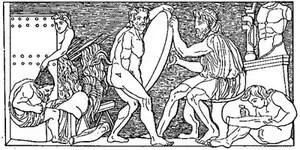
Fig. 13. The Forge of Vulcan
His wife, according to the Iliad and Hesiod's Theogony, is Aglaia, the youngest of the Graces; but in the Odyssey it is Venus. He is a glorious, good-natured god, loved and honored among men as the founder of wise customs and the patron of artificers; on occasion, as a god of healing and of prophecy. He seems to have been, when he chose, the cause of "inextinguishable laughter" to the gods, but he was by no means a fool. The famous god of the strong arms could be cunning, even vengeful, when the emergency demanded.
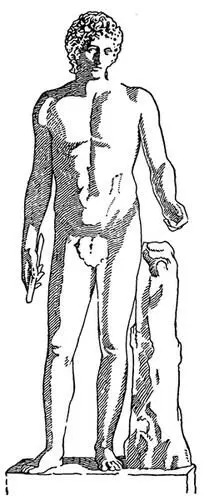
Fig. 14. Apollo in the Vatican
30. Apollo, or Phœbus Apollo, the son of Jupiter and Latona, was preëminently the god of the sun. His name Phœbus signifies the radiant nature of the sunlight; his name Apollo , perhaps, the cruel and destructive heat of noonday. Soon after his birth, Jupiter would have sent him to Delphi to inculcate righteousness and justice among the Greeks; but the golden god Apollo chose first to spend a year in the land of the Hyperboreans, where for six continuous months of the year there is sunshine and spring, soft climate, profusion of herbs and flowers, and the very ecstasy of life. During this delay the Delphians sang pæans, – hymns of praise, – and danced in chorus about the tripod (or three-legged stool), where the expectant priestess of Apollo had taken her seat. At last, when the year was warm, came the god in his chariot drawn by swans, – heralded by songs of springtide, of nightingales and swallows and crickets. Then the crystal fount of Castalia and the stream Cephissus overflowed their bounds, and mankind made grateful offerings to the god. But his advent was not altogether peaceful. An enormous serpent, Python, had crept forth from the slime with which, after the flood, the Earth was covered; and in the caves of Mount Parnassus this terror of the people lurked. Him Apollo encountered and after fearful combat slew, with arrows, weapons which the god of the silver bow had not before used against any but feeble animals, – hares, wild goats, and such game. In commemoration of this illustrious conquest, he instituted the Pythian games, in which the victor in feats of strength, swiftness of foot, or in the chariot race, should be crowned with a wreath of beech leaves. Apollo brought not only the warm spring and summer, but also the blessings of the harvest. He warded off the dangers and diseases of summer and autumn; and he healed the sick. He was patron of music and of poetry. Through his oracle at Delphi, on the slopes of Parnassus in Phocis, the Pythian god made known the future to those who consulted him. He was a founder of cities, a promoter of colonization, a giver of good laws, the ideal of fair and manly youth, – a pure and just god, requiring clean hands and pure hearts of those that worshiped him. But though a god of life and peace, the far-darter did not shun the weapons of war. When presumption was to be punished, or wrong righted, he could bend his bow and slay with the arrows of his sunlight. As in the days of his youth he slew the Python, so, also, he slew the froward Tityus, and so the children of Niobe. While Phœbus Apollo is the Olympian divinity of the sun, fraught with light and healing, spiritual, creative, and prophetic, he must not be confounded with a god of the older dynasty, Helios (offspring of Hyperion, Titanic deity of light), who represented the sun in its daily and yearly course, in its physical rather than spiritual manifestation. The bow of Apollo was bound with laurel in memory of Daphne, whom he loved. To him were sacred, also, many creatures, – the wolf, the roe, the mouse, the he-goat, the ram, the dolphin, and the swan. 30 30 On the birth of Apollo, his adventures, names, festivals, oracles, and his place in literature and art, see Commentary. For other particulars, see sections on Myths of Apollo .

31. Shelley's Hymn of Apollo.
The sleepless Hours who watch me as I lie,
Curtained with star-inwoven tapestries,
From the broad moonlight of the sky,
Fanning the busy dreams from my dim eyes, —
Waken me when their mother, the gray Dawn,
Tells them that dreams and that the moon is gone.
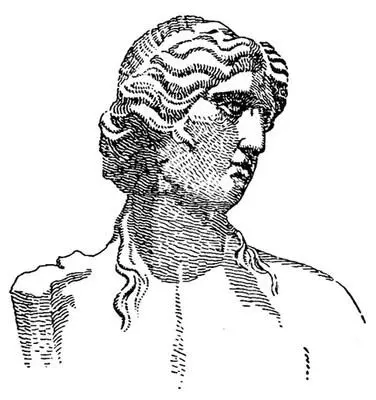
Fig. 16. Apollo
Then I arise, and climbing Heaven's blue dome,
I walk over the mountains and the waves,
Leaving my robe upon the ocean foam;
My footsteps pave the clouds with fire; the caves
Are filled with my bright presence, and the air
Leaves the green earth to my embraces bare.
The sunbeams are my shafts, with which I kill
Deceit, that loves the night and fears the day;
All men who do or even imagine ill
Fly me, and from the glory of my ray
Good minds and open actions take new might,
Until diminished by the reign of night.
I feed the clouds, the rainbows, and the flowers
With their ethereal colors; the moon's globe
And the pure stars in their eternal bowers
Are cinctured with my power as with a robe;
Whatever lamps on Earth or Heaven may shine,
Are portions of one power, which is mine.
I stand at noon upon the peak of Heaven,
Then with unwilling steps I wander down
Into the clouds of the Atlantic even;
For grief that I depart they weep and frown:
What look is more delightful than the smile
With which I soothe them from the western isle?
I am the eye with which the universe
Beholds itself and knows itself divine;
All harmony of instrument or verse,
All prophecy, all medicine, are mine,
All light of art or nature; – to my song,
Victory and praise in their own right belong.
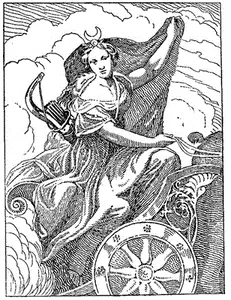
Fig. 17. Diana. After Correggio
32. Diana (Artemis), twin sister of Apollo, was born on Mount Cynthus in the island of Delos. Latona, the future mother of Diana and Apollo, flying from the wrath of Juno, had besought, one after another, the islands of the Ægean to afford her a place of rest; but they feared too much the potent queen of heaven. Delos alone consented to become the birthplace of the future deities. This isle was then floating and unstable; but on Latona's arrival, Jupiter fastened it with adamantine chains to the bottom of the sea, that it might be a secure resting-place for his beloved. The daughter of Latona is, as her name Artemis indicates, a virgin goddess, the ideal of modesty, grace, and maidenly vigor. She is associated with her brother, the prince of archery, in nearly all his adventures, and in attributes she is his feminine counterpart. As he is identified with sunlight, so is she, his fair-tressed sister, with the chaste brilliance of the moon. Its slender arc is her bow; its beams are her arrows with which she sends upon womankind a speedy and painless death. In her prerogative of moon-goddess she is frequently identified with Selene, daughter of Hyperion, just as Apollo is with Helios. Despising the weakness of love, Diana imposed upon her nymphs vows of perpetual maidenhood, any violation of which she was swift and severe to punish. Graceful in form and free of movement, equipped for the chase, and surrounded by a bevy of fair companions, the swift-rushing goddess was wont to scour hill, valley, forest, and plain. She was, however, not only huntress, but guardian, of wild beasts, – mistress withal of horses and kine and other domestic brutes. She ruled marsh and mountain; her gleaming arrows smote sea as well as land. Springs and woodland brooks she favored, for in them she and her attendants were accustomed to bathe. She blessed with verdure the meadows and arable lands, and from them obtained a meed of thanks. When weary of the chase she turned to music and dancing; for the lyre and flute and song were dear to her. Muses, Graces, nymphs, and the fair goddesses themselves thronged the rites of the chorus-leading queen. But ordinarily a woodland chapel or a rustic altar sufficed for her worship. There the hunter laid his offering – antlers, skin, or edible portions of the deer that Artemis of the golden arrows had herself vouchsafed him. The holy maid, however, though naturally gracious, gentle, and a healer of ills, was, like her brother, quick to resent injury to her sacred herds or insult to herself. To this stern temper Agamemnon, Orion, and Niobe bore regretful testimony. They found that the "fair-crowned queen of the echoing chase," though blithe and gracious, was by no means a frivolous personage.
Читать дальшеИнтервал:
Закладка:
Похожие книги на «The Classic Myths in English Literature and in Art (2nd ed.) (1911)»
Представляем Вашему вниманию похожие книги на «The Classic Myths in English Literature and in Art (2nd ed.) (1911)» списком для выбора. Мы отобрали схожую по названию и смыслу литературу в надежде предоставить читателям больше вариантов отыскать новые, интересные, ещё непрочитанные произведения.
Обсуждение, отзывы о книге «The Classic Myths in English Literature and in Art (2nd ed.) (1911)» и просто собственные мнения читателей. Оставьте ваши комментарии, напишите, что Вы думаете о произведении, его смысле или главных героях. Укажите что конкретно понравилось, а что нет, и почему Вы так считаете.
